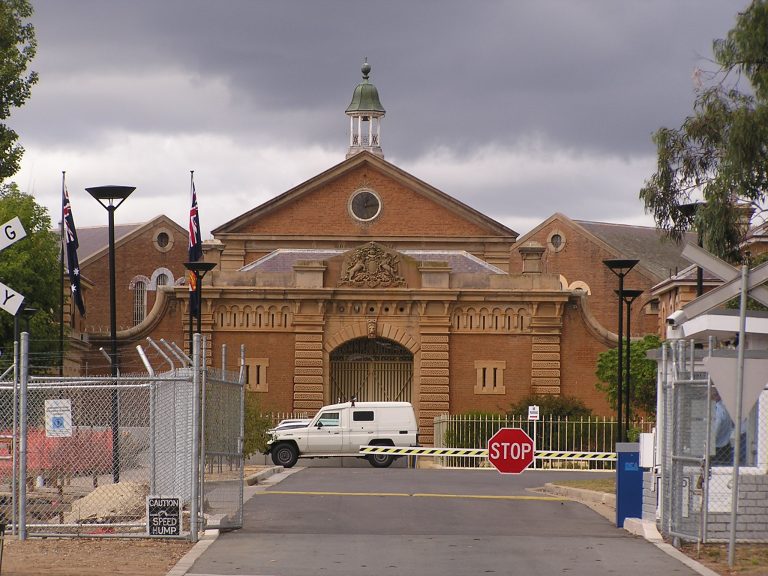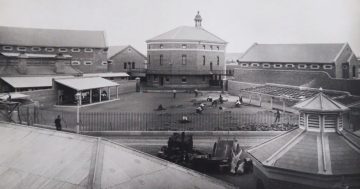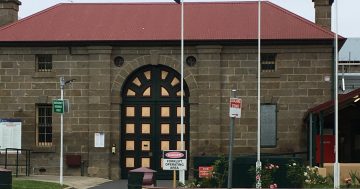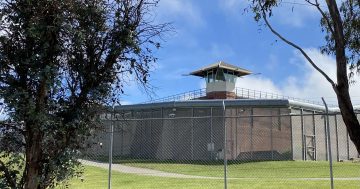
The NSW Corrective Services Commissioner has admitted parts of the Goulburn Correctional Centre are not up to standard. Photo: File.
The NSW Corrective Services Commissioner has admitted during questioning at Budget Estimates that he’s concerned about inadequate facilities at prisons across the state.
It comes just days after United Nations officials conducting surprise visits at places of detention as part of OPCAT (Optional Protocol for the Convention Against Torture and Inhuman Treatment) across the country were denied access to the Queanbeyan Courthouse cells.
Kevin Corcoran told the Budget Estimates on Monday (24 October) he was “very concerned” about the state of some facilities, including Goulburn Correctional Centre.
“We have our own standards and they don’t meet those standards,” he said.
Government representatives were further grilled on why the UN inspectors weren’t allowed access to any NSW detention facilities as part of their visit to the country, particularly if they themselves were concerned about the state of the facilities.
Security was put forward as a key reason.
“We conduct security checks of people coming in and generally people are polite enough to tell us when they’re coming in,” Mr Corcoran said.
“Unannounced visits by people we’ve never seen before is not something we’d normally contemplate.”
Mr Corcoran said while people such as the Inspector of Custodial Services could conduct random visits, they had already had security checks carried out.
This wasn’t the case with the UN OPCAT delegation.
“If we had people turning up to correctional centres then we would normally do security checks – you know, criminal history checks, etc,” he said.
“We don’t allow random people turning up to facilities unannounced to enter our facilities.”
When further pressed about whether it was fair to say UN inspectors were “random people” and that the purpose of their visit would have been lost if they had announced their arrival, the Commissioner doubled down.
“These were supposed to be preliminary visits and you would have thought that somebody would have told us who was coming and when they were coming,” Mr Corcoran said.
“The first time I heard that something was happening was when our staff members were ringing and saying there were these people purporting to be UN delegates demanding to enter the Queanbeyan court cells.”
Acting Chair Sue Higginson voiced her concerns about the inspectors being denied access, particularly given an anonymous letter from Goulburn senior correctional staff about the conditions of the prison.
“It is shocking and harrowing … it talks about terrible conditions, about inadequate shower facilities and toilet facilities, and the stress of inmates,” she said.
“In these sorts of circumstances, would you not think that we should be allowing external inspectors to come in and that that degree of transparency would be in the absolute best interests of everybody in NSW?”
The letter, dated June 22 and seen by Region, described the culture at the jail as an “1800s prison stuck in 2022” where inmates were “suffering” and had little or no prospects for rehabilitation.
“How are we expected to rehabilitate inmates when they are locked in yards all day every day with nothing to help them?” it said.
The writer described the showering situation as pushing people to “live like pigs”, having to use facilities which were in the yards and side of the wings.
“I would have thought that a shower is a basic right in addition to anything else, but it appears that a shower at Goulburn is a privilege,” the letter said.
“Inmates are expected to shower in conditions that are disgraceful, dirty and are third world – imagine showering in the open when it’s only seven degrees and raining.
“You wouldn’t do that to an animal and you would be reported to the RSPCA if you did.”
The letter also claimed toilets were out in the open with no privacy, cells didn’t have effective heating or cooling, and inmates couldn’t speak with support staff about private issues without other people listening.
“This is why they get frustrated and give up … there are simply no rehabilitation prospects for inmates here at Goulburn, warehousing I think is the term for this place,” it said.
“If you treat these inmates like animals, they will act like animals.”
Many of these issues were also raised in a recent report by the Inspector of Custodial Services.
In response to the questioning, Corrective Services Minister Dr Geoff Lee said the service tried “every day” to become more professional.
“I think the problem or issues raised in that letter stem from a few issues, and number one particularly is that parts of the Goulburn facilities are very old,” he said.
“As you said, the outdoor showers are not good, and we want to try to modernise those … we have some limitations.”
Corrective Services Assistant Commissioner Leon Taylor said five correctional centres had “Victorian-era” infrastructure, which were Goulburn, Cooma, Bathurst, Broken Hill and Tamworth.
“It is true that Victorian-era infrastructure does not easily support contemporary correctional practice without a lot of effort that we certainly apply through our diligent staff,” he said.
“The standards are the same by which we operate those facilities in terms of services that inmates have, the out-of-cell time that they have and all the other things that inmates have access to in custody.”
Cells at Goulburn are slowly being upgraded through the Prison Bed Capacity Program, which means there are new beds being used alongside 140-year-old beds.
About 400 people are still being kept in the older part of the prison.
The UN Subcommittee on Prevention of Torture (SPT) officially announced it had suspended its visit to Australia because of a “lack of co-operation”.
The delegation’s head Aisha Shujune Muhammed said they felt they had no other option.
“It is deeply regrettable that the limited understanding of the SPT’s mandate and the lack of co-operation stemming from internal disagreements, especially with respect to the states of Queensland and New South Wales, has compelled us to take this drastic measure,” she said.
“The SPT is neither an oversight body, nor does it carry out investigations or inspections. It is a mechanism that makes confidential recommendations to state parties on establishing effective safeguards against the risk of torture and ill-treatment in places of deprivation of liberty.
“Despite our numerous efforts to explain our preventive mandate, this was clearly not understood.”










